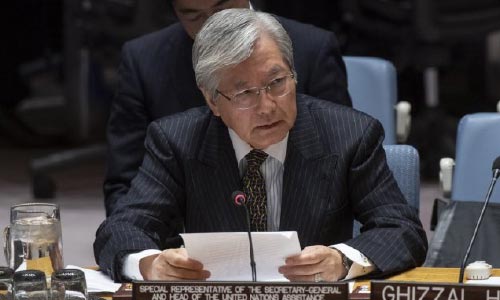KABUL - The UN secretary-general’s special representative says a negotiated end to the 17-year conflict in Afghanistan has never been more real than it is now.
Briefing the United Nations Security Council on the situation in Afghanistan on Monday, Tadamichi Yamamoto cited a string of important milestones achieved in recent months.
The developments include the appointment of a team to negotiate with the Taliban on ending their long terrorist campaign and the announcement of a peace advisory board representing a broad range of political views.
“The critical task at hand is to allow political space for the main actors to formulate their positions.” Tadamichi Yamamoto was quoted as saying in a statement from UNAMA.
“The key next step would be for representatives of the government and the Taliban to meet, or at least to formally initiate what in mediation is referred to as talks about talks,” he remarked.
For the sake of a peaceful future of Afghanistan, Yamamoto stressed the opportunities must be seized and the risks managed. The current momentum would bring a;; parties together and allow them to explore ways of moving towards a peaceful settlement, he hoped.
He urged countries in the region to contribute to the creation of an environment conducive to peace talks, allowing the people of Afghanistan to resolve their internal differences through negotiations.
The top UN diplomat insisted: “All international efforts, including those by regional actors and neighbours, need to be in concert and aligned with the Afghan-led and Afghan-owned peace efforts.”
He also mentioned the October parliamentary elections, the continuing high numbers of civilian casualties and the need to implement anti-corruption reforms in the interest of economic development.
Participating in he debate, UN Office on Drugs and Crime (UNODC) Executive Director Yury Fedetov highlighted the importance of combating corruption and controlling illicit narcotics.
Even though the area under opium cultivation and the quantity of opium being produced fell overall, largely due to drought, production levels were still high, resulting in increased rates of drugs.
He said: “This poses a grave threat to public health and safety and hinders peace-building, economic growth and stability. Balanced responses to drug supply and demand are therefore critical.” (Pajhwok)
Home » Afghanistan » UNAMA Head Renews Call for Kabul-Taliban Parleys
UNAMA Head Renews Call for Kabul-Taliban Parleys

